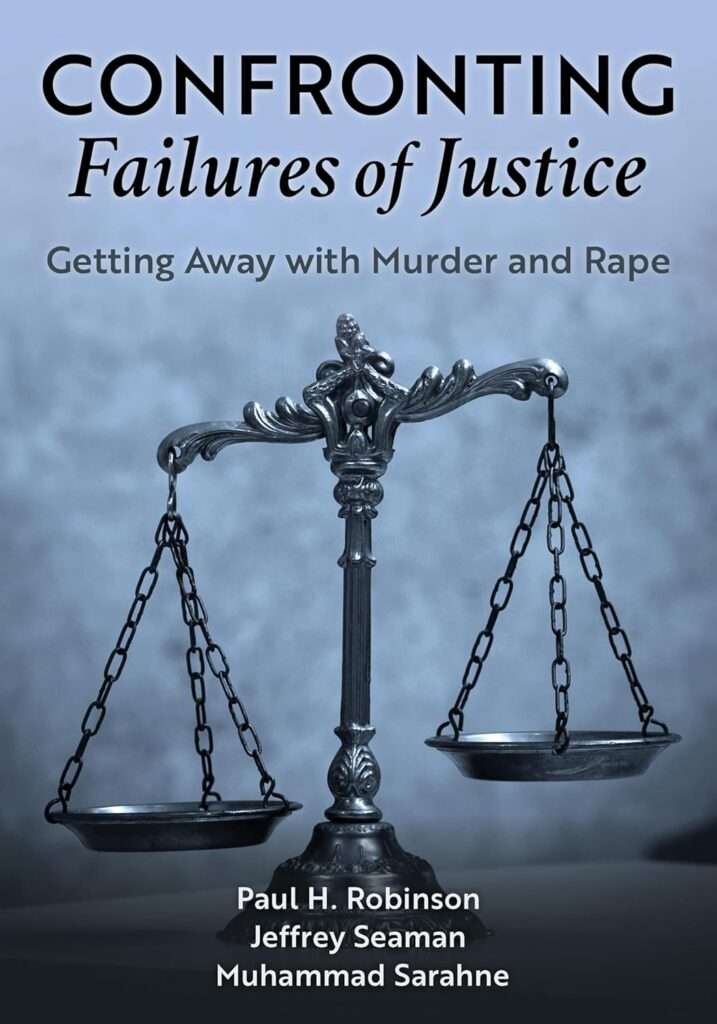
This is the first in a five-part series where we're guest blogging about our new book Confronting Failures of Justice: Getting Away With Murder and Rape, available here, which asks the question nobody seems to want to ask in legal academia: why is the justice system so bad at punishing crime? If one listened to modern academics, one might believe America's justice system punishes everyone, everywhere, for everything. But the truth is that our "carceral state," for all its supposed punitiveness, barely punishes serious crime at all. The following is an excerpt from the book's first chapter.
Most killers get away with murder. In 2020, there were around 22,000 murders in America, and police solved just over 10,000—less than 50%. Commonly, almost half of these solved cases result in no homicide conviction. Even more troublingly, homicide has the best victimization-conviction ratio of any offense. Most other crimes are rarely punished. Of more than 980,000 aggravated assaults annually, only around 7.4% end in a conviction. Of more than 460,000 rapes and sexual assaults annually, 97.2% end in no felony conviction. Hundreds of thousands of murderers, assaulters, and rapists remain free. What explains these regular failures of justice?
This book attempts to answer that question by examining the doctrines, practices, and conditions in the criminal justice system that allow serious criminals to escape the punishment they deserve. There are few simple fixes. Our analysis of the many justice-frustrating rules and practices does not conclude that all such doctrines should be eliminated. Most of these rules and practices are not irrational. Almost all are designed to protect some legitimate societal interest. However, there is reason to believe that lawmakers and system actors seriously undervalue the societal costs of failing to do justice and the societal benefits of doing it.
This volume examines the competing costs and benefits of justice-frustrating doctrines, including such topics as limitations on police investigative procedures, investigative errors, restraints on the use of investigative technology, witness intimidation, poor police-community relations, the exclusionary rule, plea bargaining, the use of anti-justice distributive principles in criminal law codification and sentencing, executive clemency, and many more. In each instance, we consider the nature and extent of the justice-frustrating problem, evaluate the competing interests, discuss reforms that could strike a more appropriate balance between the competing interests, and ultimately recommend what we think is the most important and feasible reform to make in each area.
As will become clear, many of these justice-frustrating rules and practices exist not because their creators have miscalculated the balance of interests but rather because they have done no balancing at all and instead have focused on one interest to the exclusion of all others. Our analysis suggests that for most issues there are ways to protect and promote the legitimate interests upheld by the status quo in ways that avoid or reduce the current justice-frustrating effect.
There is a particular need to address the issue of failures of justice (where offenders escape the punishment they clearly deserve) because academic attention has focused almost exclusively on the problem of the justice system doing injustice (instances of undeserved liability or overly harsh punishment). This focus is certainly understandable. Avoiding injustice is critical not only for its own sake but also for improving the criminal law's moral credibility with the community and thereby its crime-control effectiveness. But as the following analyses show, especially in chapter 3, a modern liberal society that seeks to improve the life and circumstances of all its members must take seriously its moral obligation, and the practical crime-control importance, of imposing just punishment, and not simply avoiding unjust punishment.
As should be clear from the excerpt, we understand the importance of avoiding wrongful convictions and over-punishment. But the justice system exists to deliver justice for crimes, not merely avoid over-punishment—the latter could simply be accomplished by abolishing the system entirely. Legal academia's near complete neglect of the problem of unpunished or inadequately punished crime is a massive blind spot. Some of this may be intentional, as many legal academics have an anti-punishment agenda that would not be helped by exposing how rarely crime is punished. But as our book argues (and a later post will discuss), failing to punish serious crime carries enormous societal costs. In the next post we'll look at some more facts about clearance and crime rates, and how the situation isn't solving itself.
The post It's Time to Confront Failures of Justice (Part I) appeared first on Reason.com.







